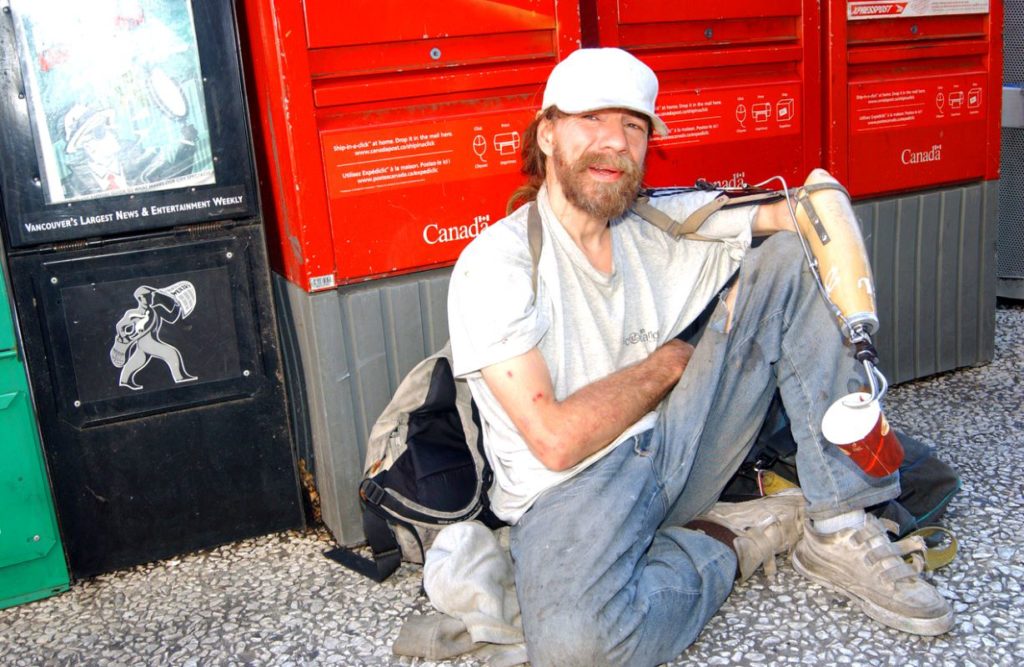British Columbia, a plentiful Canada staple and thriving tourist attraction, draws about 15 million visitors annually. They come to witness the sprawling wonder of the Sea to Sky Highway, to see what the world looks like from sea level to mountain top, to try and fit the view into a panoramic picture on their phones. The countryside’s rustic beauty is complimented by family-oriented points of interest and charming little coffee stops and B&B’s.
For many, this nature-infused setting is the ideal place to escape reality, to break away from the pressures of social media and everyday life. Perhaps, that’s why the reality of British Columbia’s homelessness is so well hidden. Could it be that we are choosing not to see it?
British Columbia Homelessness Rises by an Astounding 30% in the Past Five Years
Due to lack of income and cost of housing, British Columbia struggles with a severe homeless crisis, a problem hidden in plain sight. The situation has impacted some of the most well-known regions of B.C., such as Vancouver. But it isn’t contained within the larger metropolitan areas. The lesser known city of Surrey, home to a little over 500,000 residents, witnessed a 49% spike in homelessness between 2014 and 2018, giving way to a notorious tent city, which was recently cleaned up due to outreach.
In response to the crisis, Surrey officials, in corroboration with the B.C. government, are considering a plan to construct a three story, 38-unit modular housing structure for people on the streets. If all goes according to plan, construction could be well underway as early as this summer. For now though, the dismal numbers remain stagnant, with places like Langley, where homelessness has risen by 124%, scrambling for answers.
Solutions to Homelessness Also Require an Understanding of Underlying Issues
The root cause of homelessness in British Columbia is not only affordable housing, but also social concepts. For this reason, building new homes is the easy part. It’s those invisible walls of division that might be the most difficult to knock down. Here are some hard-hitting facts about the B.C. social crisis now being exposed through homelessness:
- Indigenous people are hit hardest by homelessness in this region. They account for 40% of all homeless people in the region, which denotes a gross over-representation. It’s notable to mention that Canada’s Indigenous have laid claim to the land for tens of thousands of years only to be left stranded in the end.
- Homeless people of all backgrounds in this particular area exhibit a life expectancy that is half that of an average Canadian. Sometimes numbers reflect our true selves in a way that words simply cannot.
- 82% of Vancouver’s homeless population suffers from at least one debilitating health condition. While the types of illness vary widely, the percentage of people suffering has been steadily increasing since 2014.
- Hundreds of homeless in the British Columbia area cited discrimination in their top five reasons for being unable to secure housing.
With a housing crisis looming, violent incidents increasing, an opioid epidemic swarming, and mounting friction between authority figures and disenfranchised members of society, there’s a whole lot hiding behind B.C.’s lush mountain-scape and the modern high-rises of Vancouver.
The Real Price of Homelessness is Something We Can’t Afford
“Homelessness is costing us billions of dollars,” one expert pointed out in an interview with CBC.
This much is true. Treatment, healthcare, psychiatric accommodations, shelters, and more cost Canada a median average of about $53,000 per homeless person, which could be enough to sway politicians toward feasible change.
In truth though, homelessness in B.C. Canada is costing us something much more precious: human lives.
The candid interviewee went on to explain that hundreds of homeless are dying on the streets of British Columbia.
Sadly, the region recently exhibited a horrifying 140% increase in homeless deaths in the area in one calendar year.
In 2016, Vancouver broke records when the number of homeless fatalities there more than doubled. That trend has continued in the past three years. It’s become clear that Vancouver’s homeless lack access to treatment. Statistically, they are more negatively impacted by the opioid crisis and lack of medical services when compared to other groups.
Many are calling for more harm-reduction services in the form of shelters, healthcare, and treatment for mental illness and addiction. Others are concerned with constructing more affordable housing as single parent households are becoming increasingly more vulnerable to the premise of life without a stable address.
The truth is, we need all of the above.
Dying Homeless: It’s Not Anything Like Dying at Home
Like it or not, we are all desensitized to the finality of death to some extent. We could blame this on the media. However, there’s a reason the debate as to whether Hollywood mimics reality or reality mimics Hollywood never ends. Either way, that five-letter word, when scrawled across a headline, no longer holds the shock factor it once did. We’ve yet to witness anyone leave this world alive – death is just a natural part of life.
What we’ve forgotten though, is that like life, death has levels of comfort and severity. The cancer patient does not die like the military soldier. And the homeless person does not die like the non-homeless person.
For example, a homeless person might die behind a dumpster of a disease we cured a hundred years ago that they didn’t even know they had. A homeless person might die at the hands of a psychopath seeking to torture someone vulnerable and defenseless. At best, a homeless person will simply die ignored, falling silently like a shadow being swallowed by the darkness of a frigid winter night.
Talk to Your Legislators About Influencing Permanent Change
There are multiple proposals on the table that could mean permanent, affordable housing for B.C.’s homeless. Contact your local legislators and tell them you support the construction of affordable housing for all people in need.












